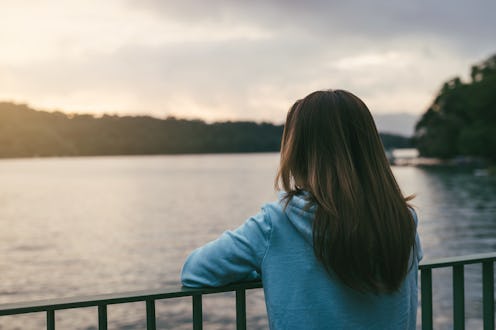Life
What To Do If You Have A Panic Attack, But You're By Yourself
Taking care of your mental health should always be a top priority. If you've suffered a panic attack before, you understand how the suffocating feeling it causes feels more like internal claustrophobia than anything else. It helps to have someone's support during a panic attack; someone to rub your back, and to ease you from the triggers that sparked the fireworks display of anxiety currently making your heart race. But sometimes nobody is around, and because of that, it helps to know what to do if you have a panic attack alone.
According to the Anxiety and Depression Society of America, 40 million people suffer from an anxiety disorder. The society explained on its website, "Anxiety disorders are the most common mental illness in the U.S., affecting 40 million adults in the United States age 18 and older, or 18.1 percent of the population every year."
You can count me as one of those 40 million people. Based off my personal experience of being engulfed by a panic attack alone — multiple times — I would advise against listening to the "Epic Film Scores" playlist on Spotify. While everyone is different, I can attest that in my case, it doesn't really help. Just a little warning.
Thankfully, though, for those who experience panic disorders in times of solitude, there are ways to settle your heart and mind.
Life coach Linda Carroll, M.S., who has experienced panic attacks herself, describes their duration to MindBodyGreen, saying, "The average panic attack usually lasts less than 10 minutes, but the fallout can continue longer. First comes the actual attack — the trouble breathing, the pounding heart, the alarmingly high blood pressure, and the tingling in your hands and feet, all of which might make you feel like you’re going to die." And that's key to remember. You are not going to die. Even though it might feel like everything is shutting down. It's not.
Panic attacks can be both expected and unexpected. If you're in a situation, like being in the insect room at a zoo when you have arachnophobia, and begin to experience symptoms of panic, that's considered expected. You know that spiders can trigger your panic. But sometimes the mere fear of having a panic attack comes without warning. When a panic attack takes you by surprise, the first step is to stay calm.
Alicia H. Clark Psy.D, a licensed clinical psychologist, tells SELF Magazine, "When you fight with your increasing panic, the anxiety sometimes tends to worsen." When it begins to feel like the collar of your shirt is tightening and there's nobody around you in the moment to assure you that you're okay, it's important to remind yourself that what's happening is a panic attack.
Once what's happening is recognized as a panic attack, make yourself as comfortable as physically possible. Doreen Corrado LCSW-R, a licensed New York State clinical social worker, tells Bustle, "Tapping into the rational side of your brain is key, find a focal point, sit in a upright chair, preferable with arms, place your feet flat on the ground and pay attention to the feeling of being 'grounding': feel your feet against the floor, try to feel each toe independently and begin to relax your body from your feet up." Another exercise that Corrado advises to practice when undergoing a panic attack is to hold an ice cube in your palm. She explains, "As it melts pay attention to the array of sensations, cold, pain, heat, the dripping water… As you focus on these sensations your brain gets a chance to shift off the anxiety." And if there is somebody who understands your panic, you can absolutely call them.
Breathing exercises can also help take your mind off of an attack. And when you're alone, plugging into a meditation can assist in lessening the harsh severity of panic. YouTube's Positive Magazine, a catalog of anxiety and panic settling meditations, tells Bustle, "within us are four easy reminders for overcoming the grips of anxiety that I’ve condensed into S.T.O.P.; Stillness. Tranquility. Oneness and Peace." Stillness asks us to pause and focus on our breath. Tranquility sees that we find a home in our body and feel safe there, knowing that we can always return to this safe place.
Oneness is described as, "During anxiety attacks it’s easy to lose touch thinking that we are powerless, but when we get centered and connected to our oneness we tap into the power of others who are one with us. Oneness in this sense is our core truth and authenticity as the center of all the beauty and good we experience and desire." And finally, with peace, we are able to move forward.
Being alone while enduring a panic attack can happen. The most important thing to remind yourself, however, is that this attack will end and you will survive it. As Corrado explains to Bustle, "Try to remember that an episode of anxiety has a beginning, middle and end, and will resolve itself." Always remember that no matter where you are, and if you're alone, that there is somebody to talk to.
